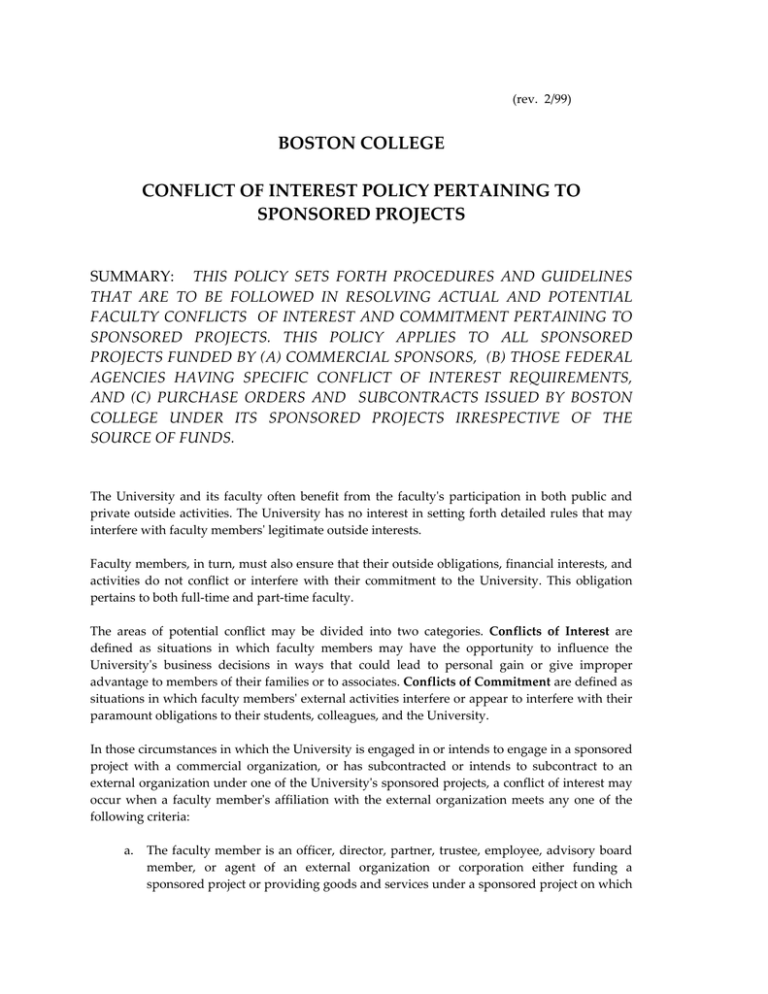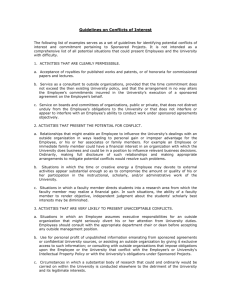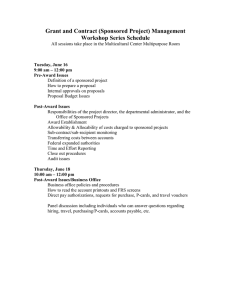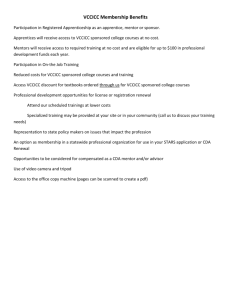BOSTON COLLEGE CONFLICT OF INTEREST POLICY PERTAINING TO SPONSORED PROJECTS
advertisement

(rev. 2/99) BOSTON COLLEGE CONFLICT OF INTEREST POLICY PERTAINING TO SPONSORED PROJECTS SUMMARY: THIS POLICY SETS FORTH PROCEDURES AND GUIDELINES THAT ARE TO BE FOLLOWED IN RESOLVING ACTUAL AND POTENTIAL FACULTY CONFLICTS OF INTEREST AND COMMITMENT PERTAINING TO SPONSORED PROJECTS. THIS POLICY APPLIES TO ALL SPONSORED PROJECTS FUNDED BY (A) COMMERCIAL SPONSORS, (B) THOSE FEDERAL AGENCIES HAVING SPECIFIC CONFLICT OF INTEREST REQUIREMENTS, AND (C) PURCHASE ORDERS AND SUBCONTRACTS ISSUED BY BOSTON COLLEGE UNDER ITS SPONSORED PROJECTS IRRESPECTIVE OF THE SOURCE OF FUNDS. The University and its faculty often benefit from the facultyʹs participation in both public and private outside activities. The University has no interest in setting forth detailed rules that may interfere with faculty membersʹ legitimate outside interests. Faculty members, in turn, must also ensure that their outside obligations, financial interests, and activities do not conflict or interfere with their commitment to the University. This obligation pertains to both full‐time and part‐time faculty. The areas of potential conflict may be divided into two categories. Conflicts of Interest are defined as situations in which faculty members may have the opportunity to influence the Universityʹs business decisions in ways that could lead to personal gain or give improper advantage to members of their families or to associates. Conflicts of Commitment are defined as situations in which faculty membersʹ external activities interfere or appear to interfere with their paramount obligations to their students, colleagues, and the University. In those circumstances in which the University is engaged in or intends to engage in a sponsored project with a commercial organization, or has subcontracted or intends to subcontract to an external organization under one of the Universityʹs sponsored projects, a conflict of interest may occur when a faculty memberʹs affiliation with the external organization meets any one of the following criteria: a. The faculty member is an officer, director, partner, trustee, employee, advisory board member, or agent of an external organization or corporation either funding a sponsored project or providing goods and services under a sponsored project on which 2 the faculty member is participating in any capacity. b. The faculty member is the actual or beneficial owner of more than five percent (5%) of the voting stock or controlling interest of such organization or corporation. c. The faculty member has dealings with such organization or corporation from which he or she derives income of more than $10,000 per year, exclusive of dividends and interest. d. The faculty memberʹs immediate family (spouse and dependent children) meet any of the criteria stated in a‐c above. Each faculty member participating in a sponsored project covered by this policy must disclose whether or not he or she has external affiliations that may constitute a conflict by falling within the criteria stated in paragraphs a‐d above. A disclosure must be completed prior to the Universityʹs acceptance of the sponsored project or issuance of a purchase order or subcontract for the acquisition of goods and services. The disclosure form (Attachment 1) is to be sent to the Office of Research Administration via the faculty memberʹs department chair or dean. Positive disclosures will be reviewed by a Conflict Review Committee consisting of the Associate Vice President for Research, the Director of Research Administration, and the University Legal Counsel. In reviewing the positive disclosures, the Conflict Review Committee will be guided by the following practices and apply them as may be appropriate: a. Assure adherence to relevant University policies such as The University Statutes, the Policies and Procedures Manual, the Faculty Handbook, the Intellectual Property Policy, the Research and Projects Policy, and other University documents the Conflict Review Committee may deem appropriate. b. Consider the nature and extent of the financial interest in the relationship of the faculty member and the external organization. c. Give special consideration to the terms and conditions of sponsored project agreements that may mitigate or complicate the given situation. d. Consult with and obtain additional information from the faculty member as either the Conflict Review Committee or the faculty member feel may be helpful in resolving actual or potential conflicts. e. Act in a timely manner so as not to delay unduly the conduct of the sponsored project. f. Conclude that the University may take one of the following actions: 1. Accept the sponsored project award. 2. Do not accept the sponsored project award. 3 3. Accept the sponsored project subject to suitable modifications in either the sponsored project award document or the external organizational affiliation(s) of the faculty member or faculty memberʹs family. If the faculty member is dissatisfied with the Conflict Review Committeeʹs conclusion, the faculty member may appeal to the Academic Vice President who will consult with the faculty member and Conflict Review Committee as the Academic Vice President deems necessary and appropriate to the particular circumstance. The decision of the Academic Vice President shall be final. Violations of this policy, such as wilfull concealment of financial interests, may result in sanctions being imposed upon the violating individual. The Conflict Review Committee will review allegations of violations and will make recommendations regarding the imposition of sanctions to the Academic Vice President. The decision of the Academic Vice President with regard to the imposition of sanctions shall be final. The Office of Research Administration shall maintain the records pertaining to each disclosure in strict confidence. Access to such records will be limited to the faculty member, the Conflict Review Committee, the Academic Vice President, and others who have a legal right to review the records. Certain sponsors, particularly federal agencies, may have requirements that differ from this policy with regard to the timing and frequency of faculty disclosures and other conflict of interest considerations as well. In the case of such discrepancies, the sponsorsʹ requirements will generally prevail. 4 APPENDIX The following list of examples serves as a set of guidelines for identifying potential conflicts of interest and commitment. It is not intended as a comprehensive list of all potential situations that could present faculty members and the University with difficulty. 1. ACTIVITIES THAT ARE CLEARLY PERMISSIBLE. a. Acceptance of royalties for published works and patents, or of honoraria for commissioned papers and lectures. b. Service as a consultant to outside organizations, provided that the time commitment does not exceed the then existing University policy, and that the arrangement in no way alters the faculty memberʹs commitments incurred in the Universityʹs execution of a sponsored agreement on the faculty memberʹs behalf. c. Service on boards and committees of organizations, public or private, that does not distract unduly from the faculty memberʹs obligations to the University or that does not interfere or appear to interfere with a faculty memberʹs ability to conduct work under sponsored agreements objectively. 2. ACTIVITIES THAT PRESENT THE POTENTIAL FOR CONFLICT. a. Relationships that might enable a faculty member to influence the Universityʹs dealings with an outside organization in ways leading to personal gain or improper advantage for the faculty member, or his or her associates or family members. For example a faculty member or family member could have a financial interest in an organization with which the University does business and could be in a position to influence relevant business decisions. Ordinarily, making full disclosure of such relationships and making appropriate arrangements to mitigate potential conflicts would resolve such problems. b. Situations in which the time or creative energy a faculty member may devote to external activities appear substantial enough so as to compromise the amount or quality of his or her participation in the instructional, scholarly, or administrative work of the University. c. Situations in which a faculty member directs students into a research area from which the faculty member may realize a financial gain. In such situations, the ability of a faculty member to render objective, independent judgment about the studentsʹ scholarly best interests may be diminished. 3. ACTIVITIES THAT ARE VERY LIKELY TO PRESENT UNACCEPTABLE CONFLICTS. a. Situations in which a faculty member assumes executive responsibilities for an outside organization that might seriously divert his or her attention from University duties. Faculty members should consult with the appropriate dean before accepting any outside management position. 5 b. Use for personal profit of unpublished information emanating from sponsored agreements or confidential University sources, or assisting an outside organization by giving it exclusive access to such information; or consulting with outside organizations that impose obligations upon the faculty member or the University that conflict with the faculty memberʹs or Universityʹs Intellectual Property Policy or with the Universityʹs obligations under sponsored projects. c. Circumstances in which a substantial body of research that could and ordinarily would be carried on within the University is conducted elsewhere to the detriment of the University and its legitimate interests. d. Any activity that a faculty member may wish to undertake on an individual basis that (a) involves or appears to involve the University significantly through the use of its resources, facilities, or the participation of academic colleagues, students, and staff, (b) involves the use of the Universityʹs name or implied endorsement, or (c) violates any of the principles set forth in the University Research and Projects Policy (for example, giving the outside organization the right to censor or prohibit publication rights for research any part of which is performed under University auspices). Rev. 3/00 BOSTON COLLEGE Faculty Disclosure Statement Regarding External Affiliations Name: Title/Rank: School/Department: Title of Sponsored Project: Name of Funding Sponsor: Project Period: Certification: I have read and understand the Boston College Conflict of Interest Policy Pertaining to Sponsored Projects. Please Respond by Inserting an “X” in the appropriate boxes: 1. Are you or any member of your immediate family (spouse and dependent children) an officer, director, partner, trustee, employee, advisory board member, or agent of the external organization funding this sponsored project or of any organization from which goods and services will be obtained under the sponsored project? yes (if so, describe in detail the nature and extent of the on an attached sheet). no. 2. Are you or any immediate family member the actual or beneficial owner of more than five percent (5%) of the voting stock or controlling interest of the external organization funding this sponsored project or any external organization from which goods and services will be obtained under this sponsored project? yes (if so, describe in detail the nature and extent of the equity interest on an attached sheet). no. 3. Have you or any member of your immediate family derived income within the past year, or do you or any member of your immediate family anticipate deriving income, exceeding $10,000 per year from (a) the external organization funding this sponsored project or (b) any external organization from which goods and services will be obtained under this sponsored project (including those to which you may be subcontracting a portion of the project work)? Do not include funds that would pay your university salary under the sponsored project budget. yes (if so, describe on an attached page the amount of the income and the reason for which it was or will be derived). no. 2 4. Do you have any affiliation with the external organization that would diminish your ability to fulfill your paramount obligations to your students, your colleagues, or the University; or have you involved any graduate student in a proprietary capacity with the external organization? yes (if so, describe on an attached page the nature of the affiliation and the amount of time per week you dedicate to it). no. Signature: Date: Important Note: The Principal Investigator must also ensure that those responsible for the design, conduct, or reporting of project work will also complete and submit disclosures and updates as may be necessary.



